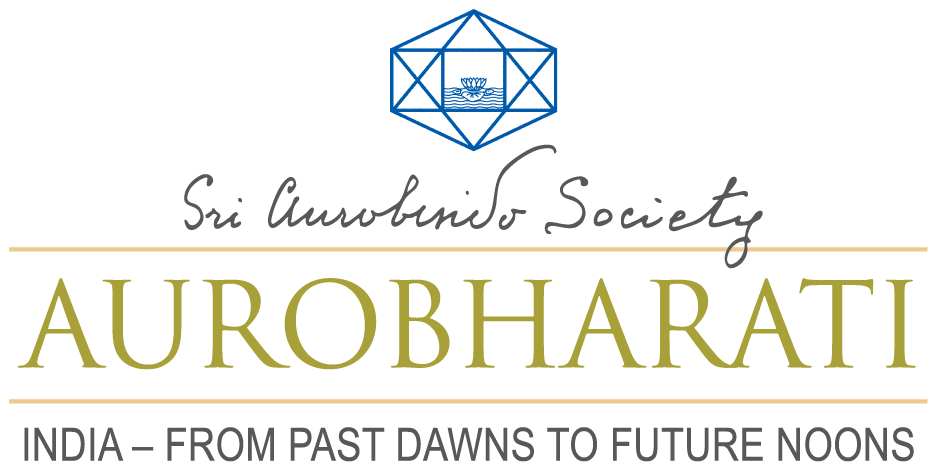World Sanskrit Day on the theme ‘Vedic Heritage & Tradition’
Location: Society House and MatriNiketan
Institute: AuroBharati
Let noble thoughts come to us from every side.
(Rigveda 1-89-1)
The Veda Samhita is the eternal source of the dharma, culture and spiritual knowledge of India.” Sri Aurobindo
ॐ मातर्दुर्गे! सिंहवाहिनि सर्वशक्तिप्रदायिनि मातः शिवप्रिये तव शक्त्यंशजा वयं भारतवर्षस्य युवानः त्वन्मन्दिरे समासीनाः त्वां प्रार्थयामहे ॥ (SriDurgastotram)
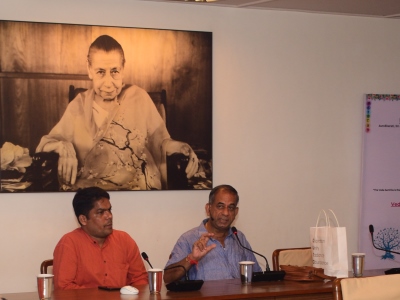 World Sanskrit Day was celebrated by AuroBharati, Sri Aurobindo Society Puducherry focusing on a week-long theme ‘Vedic Heritage & Tradition’ from 19-25 August, 2024 at Puducherry. The celebration included symposium, workshop, field visit, film screening and interactive session with an objective to explore the rich tradition of Sanskrit.
World Sanskrit Day was celebrated by AuroBharati, Sri Aurobindo Society Puducherry focusing on a week-long theme ‘Vedic Heritage & Tradition’ from 19-25 August, 2024 at Puducherry. The celebration included symposium, workshop, field visit, film screening and interactive session with an objective to explore the rich tradition of Sanskrit.
Symposium ‘Vedic Heritage in the Light of Sri Aurobindo: Intangible Culture, Tradition & Continuity’:
Inauguration of the event held on 19th August with a symposium ‘Vedic Heritage in the Light of Sri Aurobindo: Intangible Culture, Tradition & Continuity.’ Dr Alok Pandey, Sadhak from Sri Aurobindo Ashram, Puducherry spoke about the legacy of the Vedas as the fountain head of knowledge in the light of Sri Aurobindo. He emphasized the Vedas as the fountain head of knowledge and the source of all knowledge and wisdom. According to Sri Aurobindo, “Veda to be the foundation of the Sanatan Dharma; I believe it to be the concealed divinity within Hinduism,—but a veil has to be drawn aside, a curtain has to be lifted. I believe it to be knowable and discoverable. I believe the future of India and the world to depend on its discovery and on its application, not to the renunciation of life, but to life in the world and among men.” — Sri Aurobindo (Essays Divine and Human)
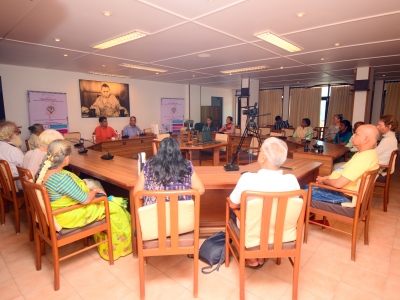 Dr Kishor Kumar Tripathy, Member Secretary, AuroBharati, Sri Aurobindo Society, Union Territory of Puducherry share insights on the intangible aspects of Vedic heritage including philological, spiritual and cultural significances. Vedas are the timeless texts that hold the key to unlocking the mystery of global history. The ancient Bharat scriptures, which are regarded as the earliest sacred books of Sanatana Dharma, are the subject of The Secret of the Vedic language. Dr Tripathy highlighted the contribution of Maharshi Aurobindo on the Vedas. He revealed the Vedic secret by interpreting and synthesizing Vedic wisdom with contemporary ideas. He saw the Vedas as a storehouse of spiritual and holistic wisdom essential to the advancement of humanity, rather than just as antiquated texts. He stressed the need of a spiritual renaissance, emphasizing spiritual and philological discoveries in particular. Significant discussion was continued with the participants through an interactive manner.
Dr Kishor Kumar Tripathy, Member Secretary, AuroBharati, Sri Aurobindo Society, Union Territory of Puducherry share insights on the intangible aspects of Vedic heritage including philological, spiritual and cultural significances. Vedas are the timeless texts that hold the key to unlocking the mystery of global history. The ancient Bharat scriptures, which are regarded as the earliest sacred books of Sanatana Dharma, are the subject of The Secret of the Vedic language. Dr Tripathy highlighted the contribution of Maharshi Aurobindo on the Vedas. He revealed the Vedic secret by interpreting and synthesizing Vedic wisdom with contemporary ideas. He saw the Vedas as a storehouse of spiritual and holistic wisdom essential to the advancement of humanity, rather than just as antiquated texts. He stressed the need of a spiritual renaissance, emphasizing spiritual and philological discoveries in particular. Significant discussion was continued with the participants through an interactive manner.
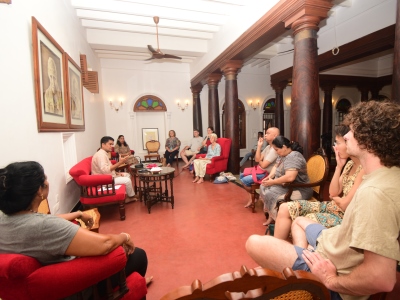 Workshop ‘The Power of Chanting the Vedic Mantras: Therapeutic use’:
Workshop ‘The Power of Chanting the Vedic Mantras: Therapeutic use’:
As part of the week-long celebration on the theme ‘Vedic Heritage and Tradition, workshop ‘The Power of Chanting the Vedic Mantras: Therapeutic use’ organized at Matriniketan, Sri Aurobindo Society, Puducherry. The workshop was facilitated by Dr. Kishor Kumar Tripathy, Member Secretary, AuroBharati, Sri Aurobindo Society. Objective of this workshop was to focus on Vedic chanting as Intangible Cultural Heritage and one of the world’s oldest surviving cultural traditions followed by an interactive session to understand and experience about Vedic chanting. Dr Tripathy spoke about Two-fold application of the Vedic tradition, including Shastra & Prayoga, peculiarities of Vedic chanting including oral tradition, origin of the Mantras, textual structure and interpretation of the Mantras were discussed during the workshop through an interactive manner. Highlighting the glorious history of the Vedas, he informed about the vision of Maharshi Aurobindo on the Vedas, including The Secret of the Veda, Hymns to the Mystic Fire and works on the Upanishads.
Significant aspects of the chanting of the mantras, including history, origin of the Mantras, textual structure and interpretation of the Mantras followed by different methods etc. were also discussed during the workshop. Second part of the workshop was focused on chanting of the Mantras. Textual peculiarities of the Vedas, i.e. phonetics, morphology, sentence formation and the system of Vedic interpretation followed by different methods were discussed. Specific demonstration was given to the participants to pronounce simple Vedic mantras from the Vedas and the Upanishads with Swaras (uddata, anudatta and svarita), Mudras (hand gestures), Chhandas (metre) and the associated gods and seers of the mantras.
The workshop was attended by approximately twenty participants from Puducherry, Tamil Nadu, Italy and Germany.
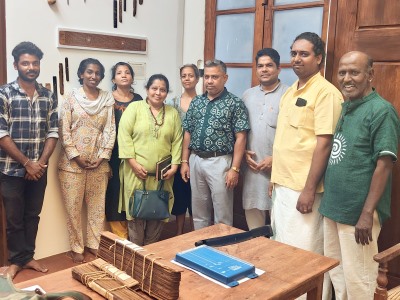 Visit to the French Institute of Pondicherry:
Visit to the French Institute of Pondicherry:
As part of the week-long celebration of ‘Vedic Heritage and Tradition’, visiting the French Institute of Pondicherry and talking with the officials/staff about the extensive collection of manuscripts was a delightful experience. On this occasion, Dr. Deviprasad Mishra, Deputy Director, Dept. of Indology, FIP and Dr Kishor Kumar Tripathy, Member Secretary, AuroBharati, Sri Aurobindo Society shared their views on important aspects of Manuscripts, including origin and development of scripts, different types of manuscripts, conservation process and cataloguing. The repository of texts on the Vedas and related knowledge system is extensive at the institute. The participants have responded well, and many have expressed interest in supporting the Mother’s work program moving forward.
Screening of Sri Aurobindo’s ‘Hymn to Durga’ (Durga Stotram) in Sanskrit:
Sri Aurobindo wrote this Durga Stotra for the Bengali journal titled Dharma. Sri Aurobindo’s Durga Stotra was published in Bengali in 1909 and translated into English by Nolini Kanta Gupta, with Sri Aurobindo’s editions.
ॐ मातर्दुर्गे! सिंहवाहिनि सर्वशक्तिप्रदायिनि मातः शिवप्रिये तव शक्त्यंशजा वयं भारतवर्षस्य युवानः त्वन्मन्दिरे समासीनाः त्वां प्रार्थयामहे ॥
Screening of film ‘Sri Aurobindo:Glimpses of His Life in Sanskrit’:
Sri Aurobindo, the yogi, seer, philosopher, poet and Indian nationalist propounded the philosophy of divine life on earth. He has given special emphasis on the divinity that would hasten the descent of the Divine into earthly life and transform it into a Divine Life. His contribution to Indian ethos will be celebrated for generations to come. During his lifetime, he not only aroused patriotic fire but touched every aspect of human life through his poems and writings. As part of the week-long celebration of Sanskrit language on the theme ‘Vedic Heritage and Tradition’,a film ‘Sri Aurobindo- Glimpses of His Life’ in Sanskrit’ by AuroFilms, Sri Aurobinso Society was screened.
Click here for youtube link .
Workshop ‘Balasamskritam: Sanskrit for Children’:
On this occasion, a workshop for introducing Sanskrit for the Children was done at Sri Aurobindo Society. Dr Tripathy shared innovative ideas for the implementation of Sanskrit including philological and scientific peculiarities.
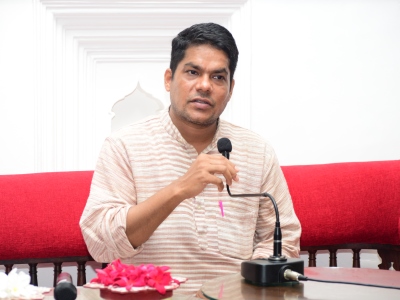 Selected chanting of the Vedas on Devavani-AuroBharati Sanskrit Radio:
Selected chanting of the Vedas on Devavani-AuroBharati Sanskrit Radio:
On this occasion, selected suktas from the Rigveda was presented at the AuroBharati Radio.
‘Vedic Heritage Tradition’, this week-long celebration focused on the significance of Sanskrit as a language of consciousness with special emphasis on the Vedas.
ॐ नमो भगवते श्रीअरविन्दाय
(om namo bhagavate sriaravindaya) is a mantra for spiritual perfection and progress. It means “Om, I offer my obeisance to the Divine Personality of Sri Aurobindo.”
Sanskrit ! Everyone should learn that. Especially everyone who works here should learn that not the Sanskrit of the scholars all, all of them, wherever they may have been born.
(11 November 1967)
… the vital question is how we are to learn and make use of Sanskrit and the indigenous languages so as to get to the heart and intimate sense of our own culture and establish a vivid continuity between the still living power of our past and the yet uncreated power of our future…..” (Sri Aurobindo)
Jayatu Bharatam Jayatu Samskritam.
